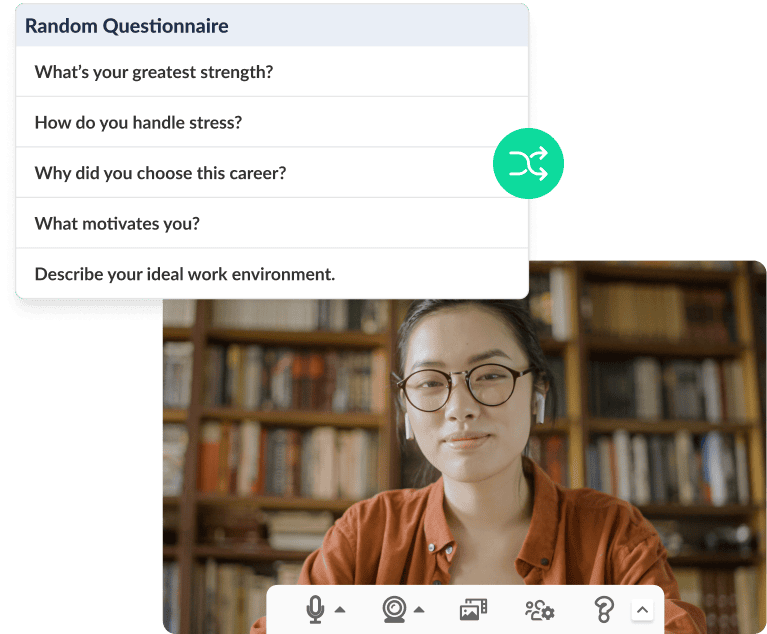
Use Exit Interviews To Improve Hiring
Learn how to get valuable insights to reduce turnover, improve the employee experience, and hire better.

Hiring students right out of university or college can be a very competitive game for companies looking to snag their share of the new generation of top talent. Companies spend huge amounts of resources in recruiter time, travel and set-up costs for career fairs and campus visits to promote their brand and company values with hopes of attracting the best and brightest students entering the workforce.
While making yourself and your brand visible in a sea of companies trying to do the exact same thing is in itself an uphill battle, another challenge is finding the time to properly screen and interview each candidate once your talent pipeline is full. Consequently, employers often miss out on some of the best candidates due to sheer volume limitations, inefficient or outdated recruitment processes and time constraints.
In this scenario, modern recruitment software tools offer practical solutions to these common challenges and many more.

Let’s face it, the manual or “traditional” hiring process tends to be slow, complicated and doesn’t always produce the best results. Campus recruiting teams may struggle with finding time to efficiently reach out and engage enough candidates to fulfill their hiring needs. Not only is there not enough time to screen and interview enough applicants in-person, but with the complexity and costs associated to recruiting at a distance, talent acquisition teams are often reluctant to reach out to larger audiences and end up relying too heavily on their core schools, ultimately missing out on qualified hiring opportunities.
Solution: Widen your candidate Pool, extend your reach and meet more students, faster
With online interviews, you can easily expand your reach and target different schools without having to visit every campus individually. In saying this, above and beyond the obvious cost savings for recruiters in terms of travel, it’s about introducing efficiency into your process and helping your recruiting team make the best of the time they have. Many companies are now using career counselors to help promote video interviewing and video profiles to the graduate population as a way to help increase their visibility among organizations looking for student talent.
Leave campus visits feeling accomplished and having interacted with as many students as possible. Collect valuable student data and video resumes to revisit when new job vacancies come up, or quickly and efficiently share profiles with other hiring managers for a second opinion. With video profiles, managers who weren’t able to physically attend the campus visits get to participate and weigh in on the full campus recruitment experience.
Pro-Tip: On-campus recruiting tools
Campus visits and career fairs are great ways for companies to meet prospects for the first time. However, beyond exchanging pamphlets, business cards, and resumes, it’s hard for recruiters to keep track and remember who they interacted with (and who the standouts were). Leveraging tools like video hiring can help engage more students, reinforce the screening and hiring process significantly as well as build a video database of qualified students to pick from as the demand grows.
Create QR codes to quickly register applicants for the interview at campus visits, or better yet, set up an interview room as a part of your company’s booth at a career fair and have applicants complete one-way video interviews on the spot (either from their own mobile devices or from tablets that you provide) so you can review them at a later date.

Students are no longer interested in talking to recruiters only from Monday to Friday between the hours of 9 to 5 – the new generation of students and employees have different expectations and look for more flexibility, transparency, and versatility in the interview process.
Solution: One-way interviewing gives graduates the flexibility to complete interviews and assessments at their convenience
Once your list of candidates has been determined, automatically move them on to the screening stage by sending them to a video interview, which they can complete at their convenience (include time limits to apply some pressure and ensure a fast and efficient workflow for your recruiting team). At this point, your candidates will simply receive an email that invites them to take part in a one-way interview. A link within the email will take them to your virtual interviewing platform where they will be guided step by step through their interview process. The era of the 9 to 5, Monday to Friday recruiting schedule is over. With recruitment platforms like VidCruiter, students and graduates have the flexibility to complete their screening interviews at a time and place that is most convenient for them.
Pro-Tip: Utilize an interview question randomizer to prevent cheating between students
Worried some crafty students might try to take advantage of the platform’s flexibility by cheating and sharing answers to your interview questions? With a platform like VidCruiter, you can put in place mechanisms like an interview question randomizer to have every interview and assessment be different from one another, ultimately ensuring your candidates are playing fair and not sharing critical data about your recruitment process between themselves.

In fact, studies have shown that companies who promote inclusivity and diversity in the workplace tend to see direct positive results. According to a 2015 Deloitte report, 83 percent of millennials are more engaged at work when their organization actively cultivates a sense of inclusivity.
To ensure a diverse and inclusive work environment, the first step is to make sure you’re hiring the right people. The best way to do this is to establish a recruitment process that is completely fair and objective and that enables you to reach out and engage with the right audiences, no matter where they are located. The reality is, no matter how much of an effort your recruiters are putting into being fair, without the right structure and tools in place, the traditional recruitment process has its limits and tends to open the door to personal and/or unconscious bias.
Recruiters and interviewers should assume there is at least some bias embedded in their hiring process, not because they must be bad people but because statistically speaking, bias is there.

Anna Peters
CollegeRecruiter.comSolution: Make diversity and workplace inclusivity a Part of your brand
Promote your company values adequately, address biases in the recruitment process and collect valuable applicant data to support you in your hiring decisions with a structured interview process that includes elaborate competency guides and rating rubrics.
Today’s college and university students expect employers to offer an environment where all are welcome and valued. As mentioned above, tools like pre-recorded video interview software allow recruiters to extend their reach and meet with students from many different schools rather than just their few core institutions. This enables them to engage with more rich and diverse communities and talent pools across the country.
Millennials and Gen Zs don’t look for work in the same way their parents did, and your company’s recruitment process should reflect these trends accordingly. Your hiring process represents a critical opportunity for your company to brand itself as a top employer and a desirable place to work for students looking to get their first “career job”. Whether you believe it or not, in today’s competitive talent landscape, there is no denying that an outdated hiring process puts you at a clear disadvantage compared to the more innovative and tech-savvy competition.
Solution: Elevate your brand and get your students interacting with top employers digitally with video interviewing
Set yourself apart as an innovative, high-tech, desirable work environment and attract top talent in an extremely crowded and competitive market. Recruit the best students, interns and graduates fast and efficiently with video interview software and offer a top-tier candidate experience to the new generation of young workers.
Make a lasting impression on students and give them the freedom to complete video interviews on an intuitive and responsive mobile-friendly platform.
For recruiters, speed up your workflow by watching videos, rating candidates and sharing key insights in real time from anywhere, and on any device, whether it’s a smartphone, tablet, laptop or desktop.

Nowadays, students have an abundance of choices when it comes to their job hunt, if companies don’t invest time and effort in making a solid first impression and setting themselves apart, they risk being overlooked by top student talent. The fact is, outdated campus recruitment techniques don’t stand out in a market that is, as previously mentioned, extremely crowded and competitive.
People have too many excellent tech experiences in their personal lives that they expect technology in their professional lives. Organizations can’t afford not to invest in their technology. It’s a necessary component of the candidate and employee experience.

Sharlyn Lauby,
HRBartender.comFailing to provide a positive candidate experience has a much bigger impact in the digital age than ever before. Students and candidates are quick to voice their opinions when their expectations aren’t met, and social media happens to give their voice a significantly larger audience. In saying this, nowadays it’s equally as important to pay close attention to how you recruit as well as who you recruit.
Solution: Enhance the candidate experience with a focus on introducing students to your business and its core values
Engage Students with the latest and greatest recruitment techniques. Set yourself apart as a progressive organization and a thought leader in your space with an extensive recruitment tool-kit that delivers real results.
Anna Peters stresses, “the candidate experience is important, and recent grads want to be engaged and feel welcomed from the minute they see the job advertisement, through the application, interviewing, negotiation and hiring process”.
Consider this, your graduate and/or internship recruitment process is the first impression that students will get of your business. Does your hiring team have the time to make it a memorable one? By replacing phone screens with asynchronous video interviews and automating tedious yet necessary tasks like interview scheduling software and reference check software, a campus recruitment software frees up your recruiters’ time to focus on making that first touch a positive one for students across the board.
The most important and perhaps toughest truth to swallow about resumes is that they are not the make-or-break documents they are often thought to be. Of course, they are a very important part of any recruitment process and critical to finding good jobs, but at the end of the day, they are just words on paper. The reality is that candidates are much more complex and diverse and there are certain crucial elements to a good hire that recruiters simply can’t get from a resume.
Solution: Get more out of your screening process – go beyond the traditional resume
Entrepreneur and speaker Cornelius McGrath sums it up pretty well: resumes are a terrible way to predict a candidate’s job performance. Not only is it too easy to lie on your CV, but companies who deal with high volumes don’t have the time to process them thoroughly. By leveraging the hiring technology that is available today, you can give students the opportunity to really showcase themselves in a video profile or use one-way video screens to see who you’re going to be meeting with before the campus visit.
Resumes are actually terrible predictors of job performance, and thus, are equally terrible at identifying candidates who might indeed be excellent job performers. This is because 49% of job candidates will lie on their resumes, and since companies often receive hundreds, if not thousands, of resumes for a single position, recruiters simply cannot give each individual resume a thorough examination.

Cornelius McGrath,
LinkedIn Top Voice

VidCruiter is used by a wide variety of clients in a multitude of different ways when it comes to recruiting on university and college campuses. Whether it’s On-Campus Recruiting or Career Services, employer hiring teams looking to identify top graduates, or admissions teams, our tools were built and continue to be improved to make the lives of campus recruiters easier.
Engage, interview and hire top talent faster with VidCruiter
Enhance your hiring process with a platform that is built for recruiters.
A cover letter should explain why you’re interested in the job and why you would be the best candidate. It’s a tool to help you stand out from other applicants by giving the hiring manager more insight into your personality and life experiences.
A resume covers what you’ve done (e.g., work experience, education, skills, accomplishments, etc.). A cover letter should explain why you’re a great fit for the job. It’s also an opportunity to give recruiters more of a sense of who you are, outside of your education and work experience.
It depends. Not all job applications or employers require a cover letter. Still, including one (even if it’s not needed) will show that you’re genuinely interested in the role and willing to go the extra mile.
Modernize your hiring process with expert insights and advice.